Quotes & Sayings About Psychological Horror
Enjoy reading and share 49 famous quotes about Psychological Horror with everyone.
Top Psychological Horror Quotes
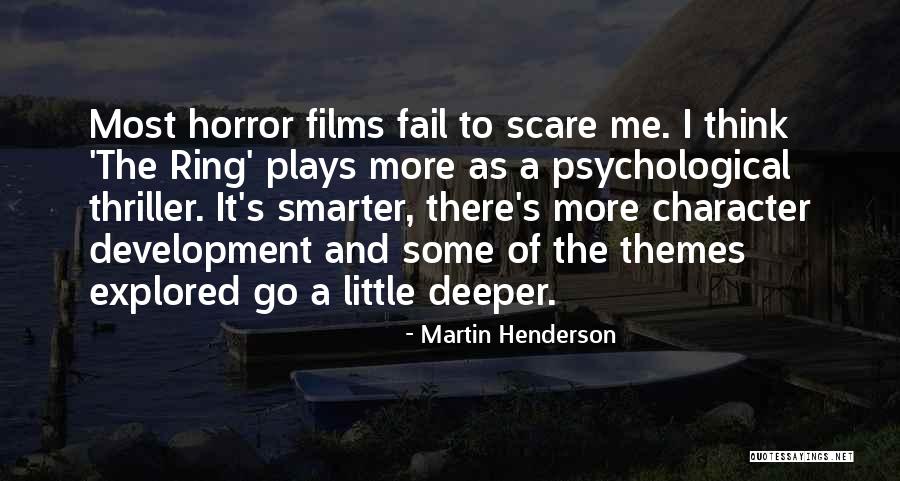
Most horror films fail to scare me. I think 'The Ring' plays more as a psychological thriller. It's smarter, there's more character development and some of the themes explored go a little deeper. — Martin Henderson
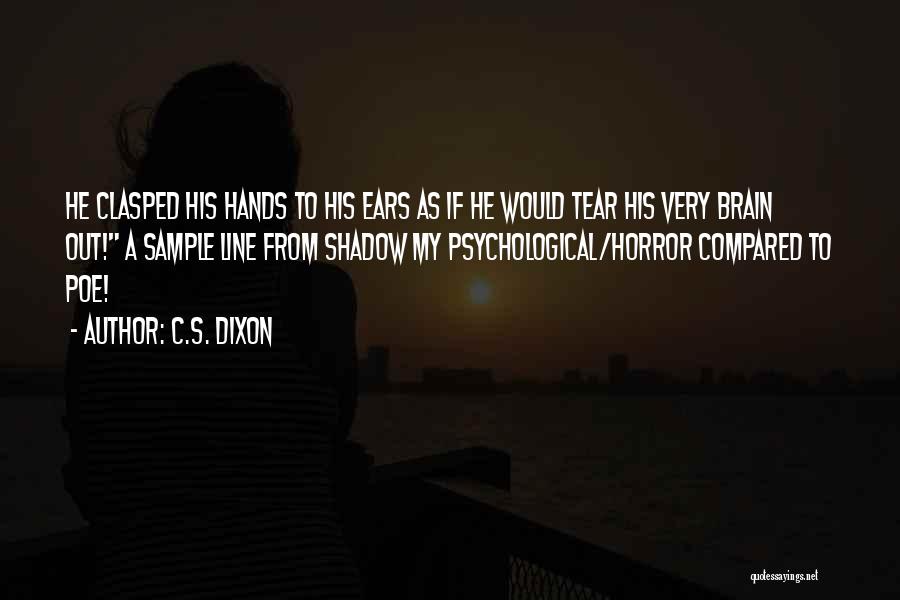
He clasped his hands to his ears as if he would tear his very brain out!" A sample line from Shadow my psychological/horror compared to Poe! — C.S. Dixon
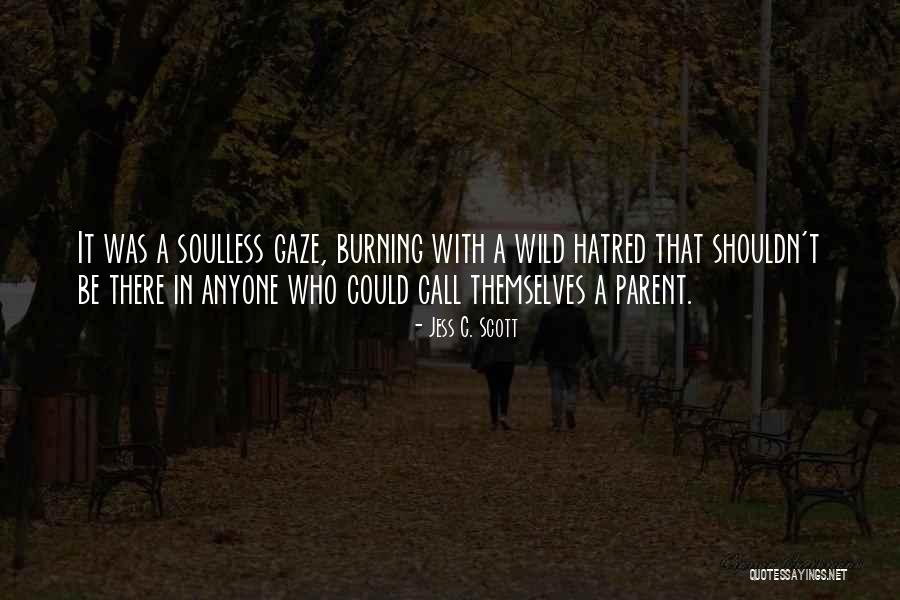
It was a soulless gaze, burning with a wild hatred that shouldn't be there in anyone who could call themselves a parent. — Jess C. Scott
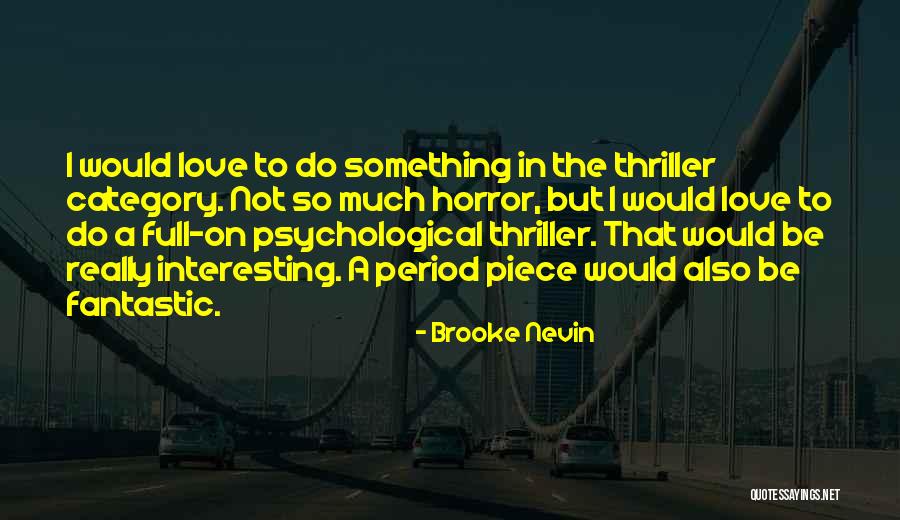
I would love to do something in the thriller category. Not so much horror, but I would love to do a full-on psychological thriller. That would be really interesting. A period piece would also be fantastic. — Brooke Nevin
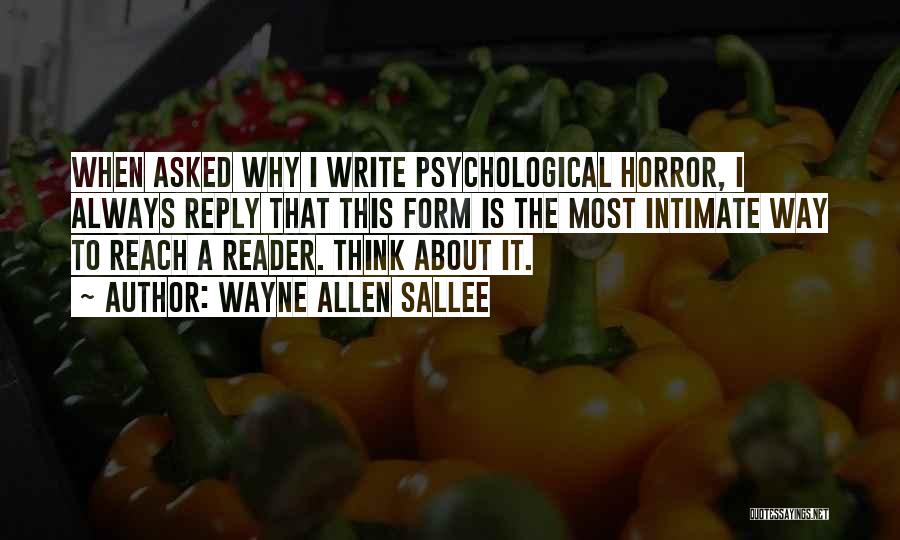
When asked why I write psychological horror, I always reply that this form is the most intimate way to reach a reader. Think about it. — Wayne Allen Sallee
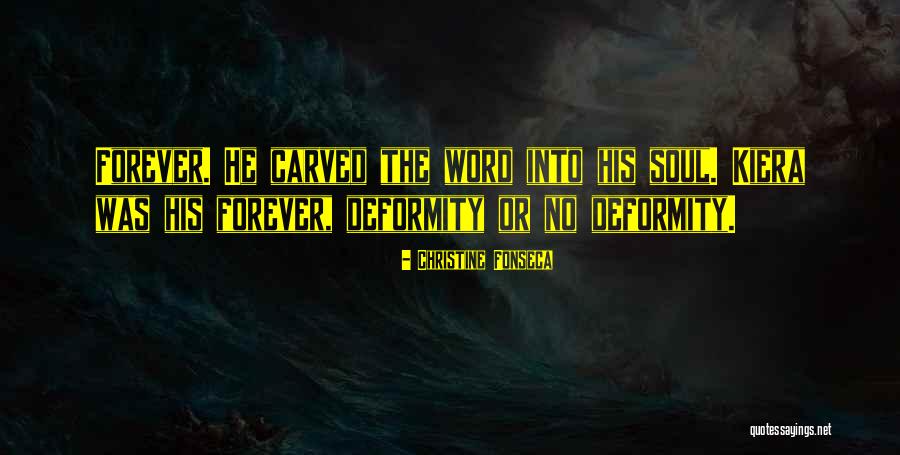
Forever. He carved the word into his soul. Kiera was his forever, deformity or no deformity. — Christine Fonseca
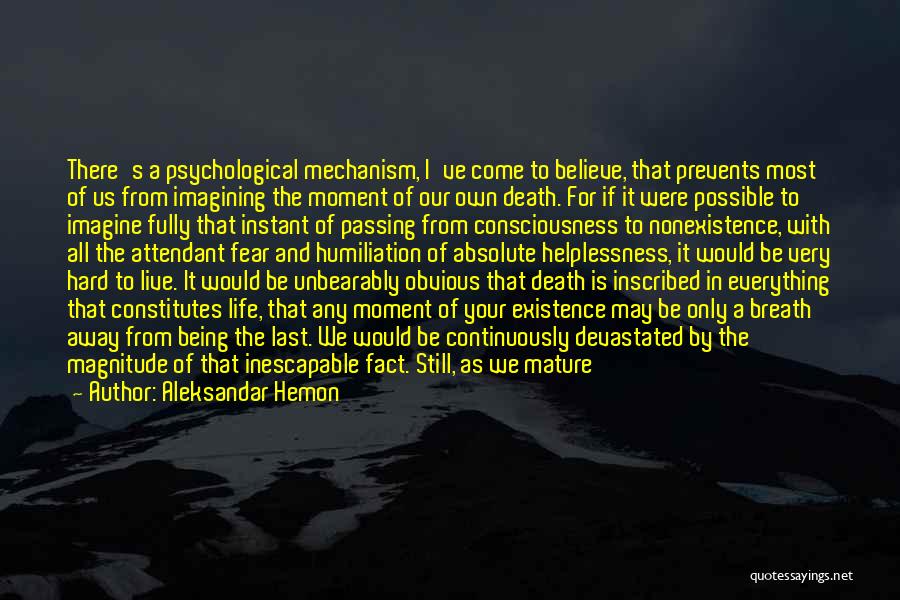
There's a psychological mechanism, I've come to believe, that prevents most of us from imagining the moment of our own death. For if it were possible to imagine fully that instant of passing from consciousness to nonexistence, with all the attendant fear and humiliation of absolute helplessness, it would be very hard to live. It would be unbearably obvious that death is inscribed in everything that constitutes life, that any moment of your existence may be only a breath away from being the last. We would be continuously devastated by the magnitude of that inescapable fact. Still, as we mature into our mortality, we begin to gingerly dip our horror-tingling toes into the void, hoping that our mind will somehow ease itself into dying, that God or some other soothing opiate will remain available as we venture into the darkness of non-being. — Aleksandar Hemon
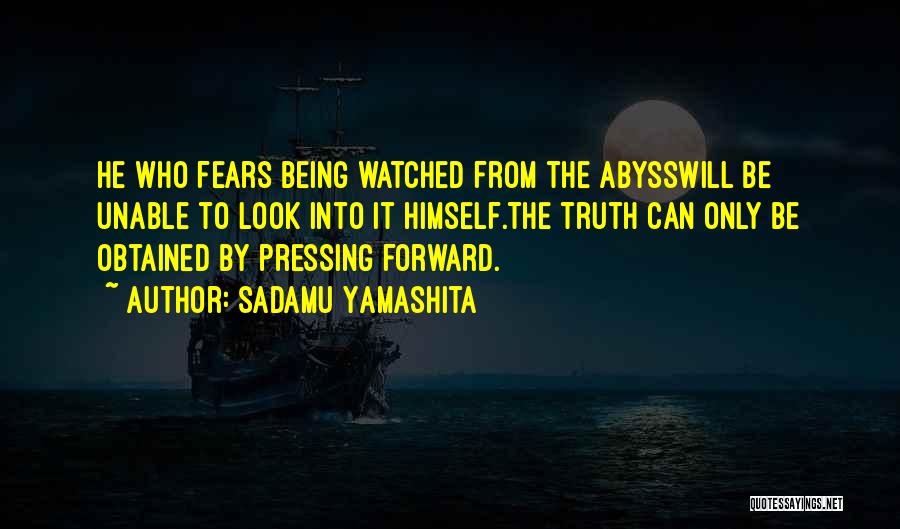
He who fears being watched from the abyss
will be unable to look into it himself.
The truth can only be obtained by pressing forward. — Sadamu Yamashita
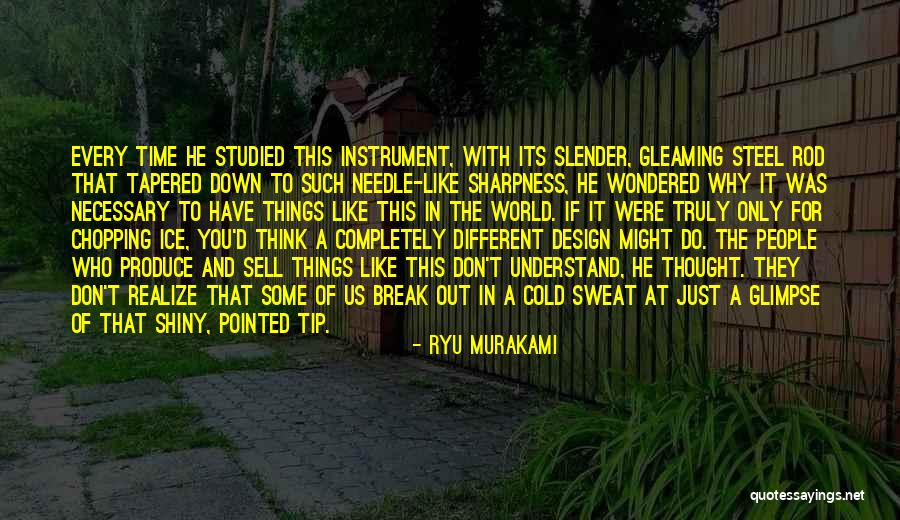
Every time he studied this instrument, with its slender, gleaming steel rod that tapered down to such needle-like sharpness, he wondered why it was necessary to have things like this in the world. If it were truly only for chopping ice, you'd think a completely different design might do. The people who produce and sell things like this don't understand, he thought. They don't realize that some of us break out in a cold sweat at just a glimpse of that shiny, pointed tip. — Ryu Murakami
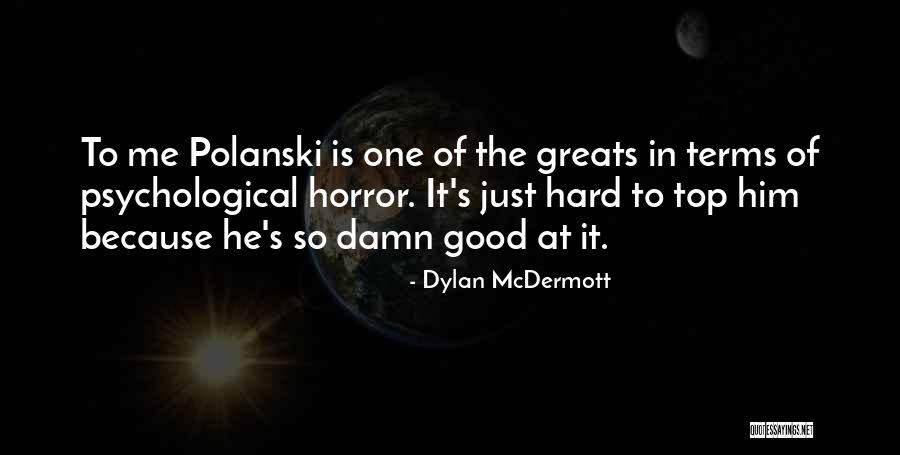
To me Polanski is one of the greats in terms of psychological horror. It's just hard to top him because he's so damn good at it. — Dylan McDermott
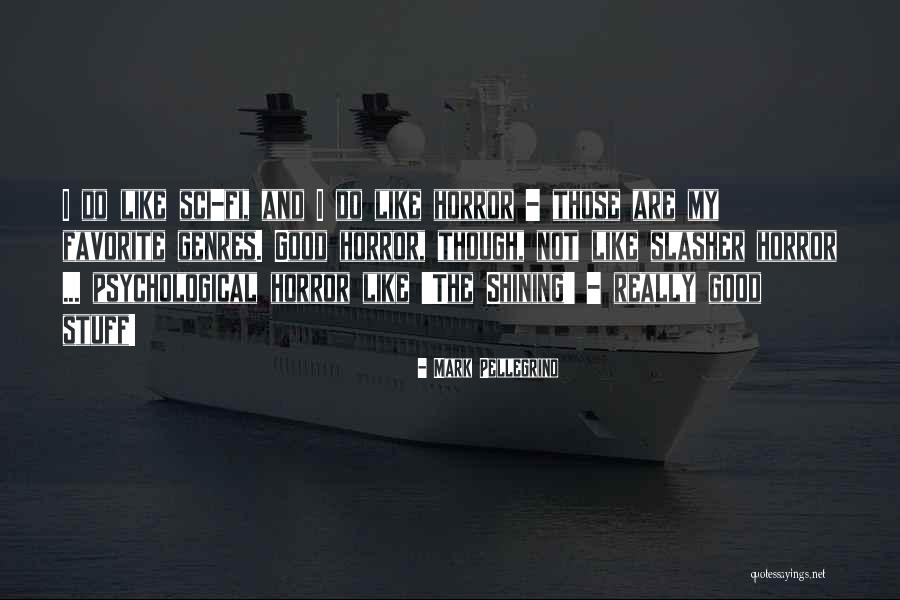
I do like sci-fi, and I do like horror - those are my favorite genres. Good horror, though, not like slasher horror ... psychological horror like 'The Shining' - really good stuff! — Mark Pellegrino
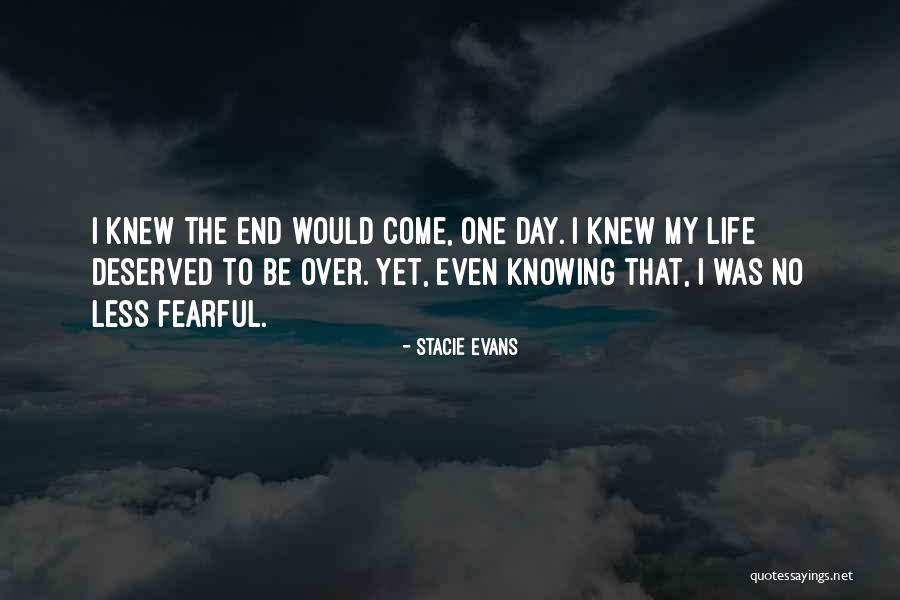
I knew the end would come, one day. I knew my life deserved to be over. Yet, even knowing that, I was no less fearful. — Stacie Evans
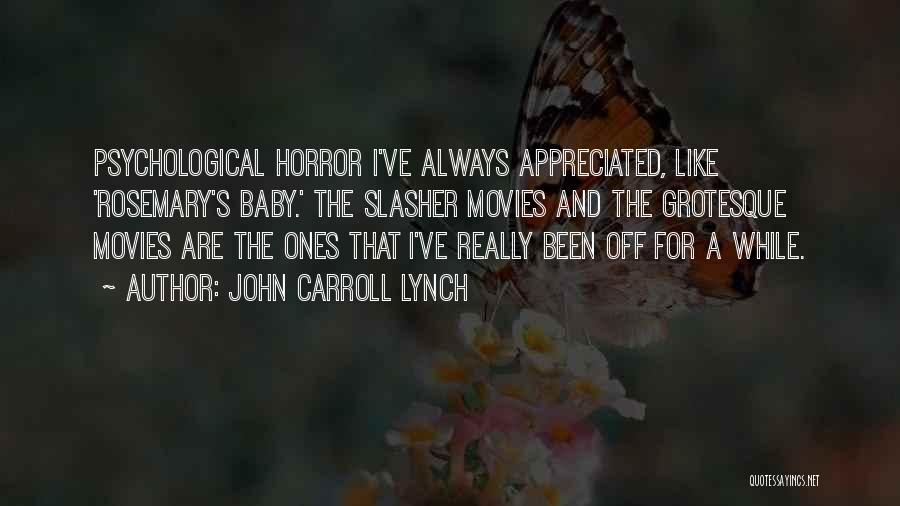
Psychological horror I've always appreciated, like 'Rosemary's Baby.' The slasher movies and the grotesque movies are the ones that I've really been off for a while. — John Carroll Lynch
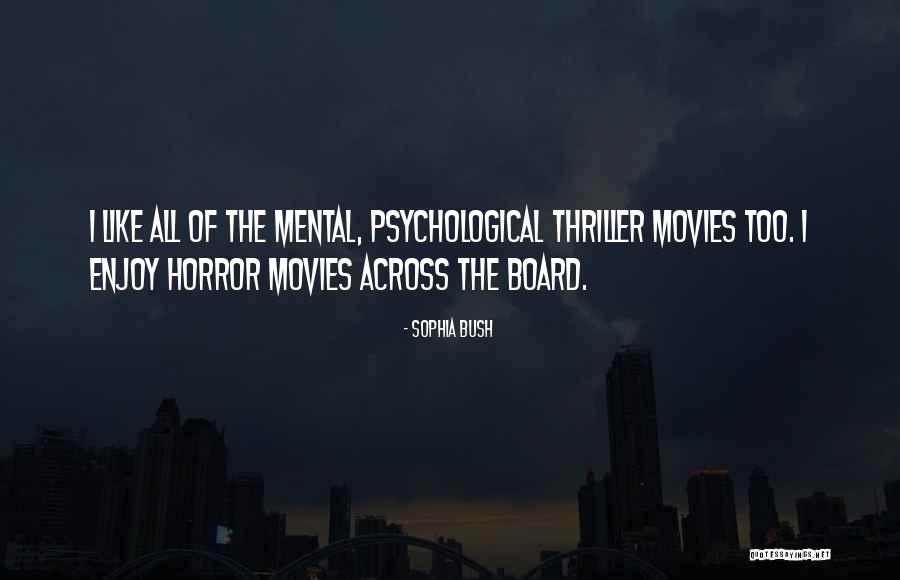
I like all of the mental, psychological thriller movies too. I enjoy horror movies across the board. — Sophia Bush
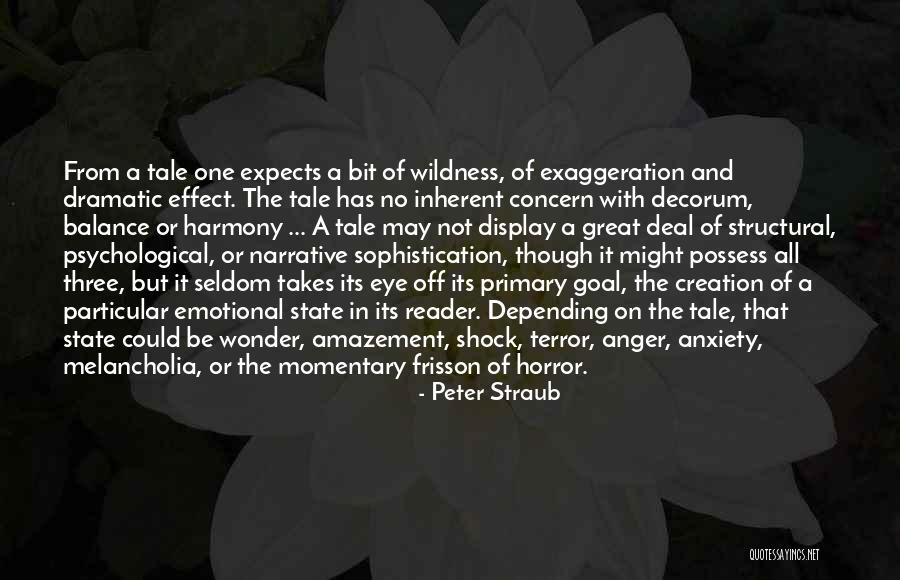
From a tale one expects a bit of wildness, of exaggeration and dramatic effect. The tale has no inherent concern with decorum, balance or harmony ... A tale may not display a great deal of structural, psychological, or narrative sophistication, though it might possess all three, but it seldom takes its eye off its primary goal, the creation of a particular emotional state in its reader. Depending on the tale, that state could be wonder, amazement, shock, terror, anger, anxiety, melancholia, or the momentary frisson of horror. — Peter Straub
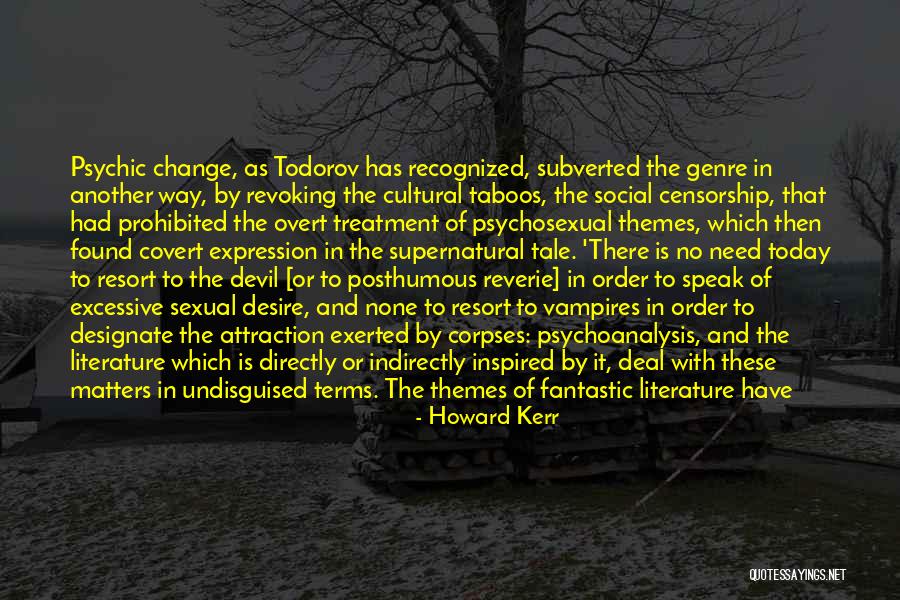
Psychic change, as Todorov has recognized, subverted the genre in another way, by revoking the cultural taboos, the social censorship, that had prohibited the overt treatment of psychosexual themes, which then found covert expression in the supernatural tale. 'There is no need today to resort to the devil [or to posthumous reverie] in order to speak of excessive sexual desire, and none to resort to vampires in order to designate the attraction exerted by corpses: psychoanalysis, and the literature which is directly or indirectly inspired by it, deal with these matters in undisguised terms. The themes of fantastic literature have become, literally, the very themes of the psychological investigations of the last fifty years. — Howard Kerr
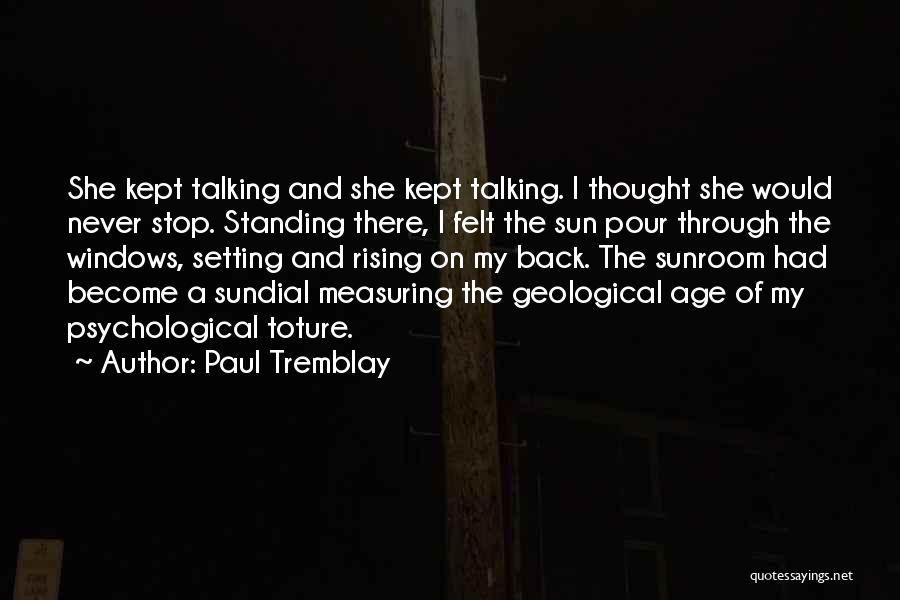
She kept talking and she kept talking. I thought she would never stop. Standing there, I felt the sun pour through the windows, setting and rising on my back. The sunroom had become a sundial measuring the geological age of my psychological toture. — Paul Tremblay
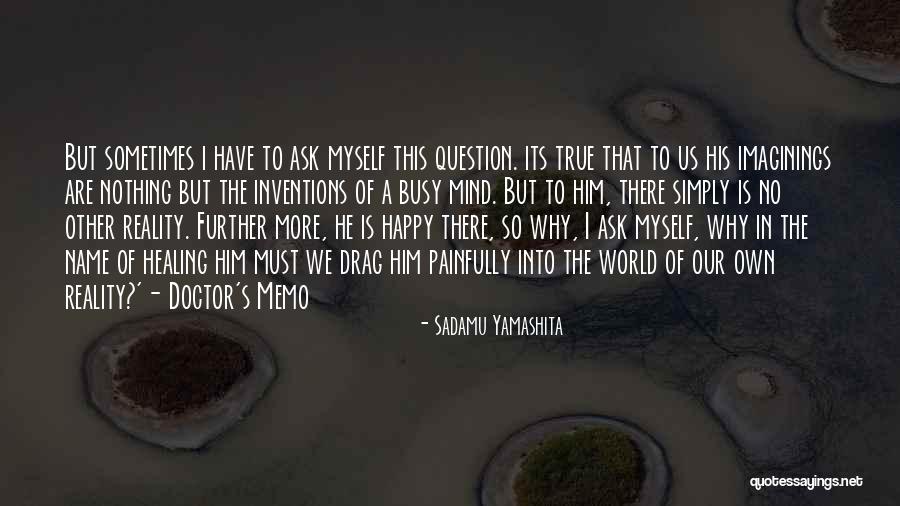
But sometimes i have to ask myself this question. its true that to us his imaginings are nothing but the inventions of a busy mind. But to him, there simply is no other reality. Further more, he is happy there, so why, I ask myself, why in the name of healing him must we drag him painfully into the world of our own reality?'
- Doctor's Memo — Sadamu Yamashita
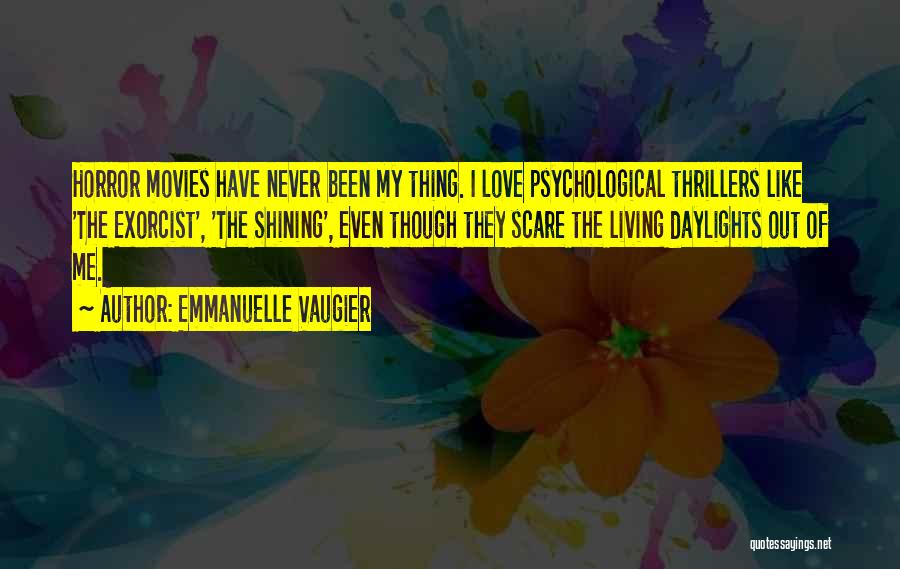
Horror movies have never been my thing. I love psychological thrillers like 'The Exorcist', 'The Shining', even though they scare the living daylights out of me. — Emmanuelle Vaugier
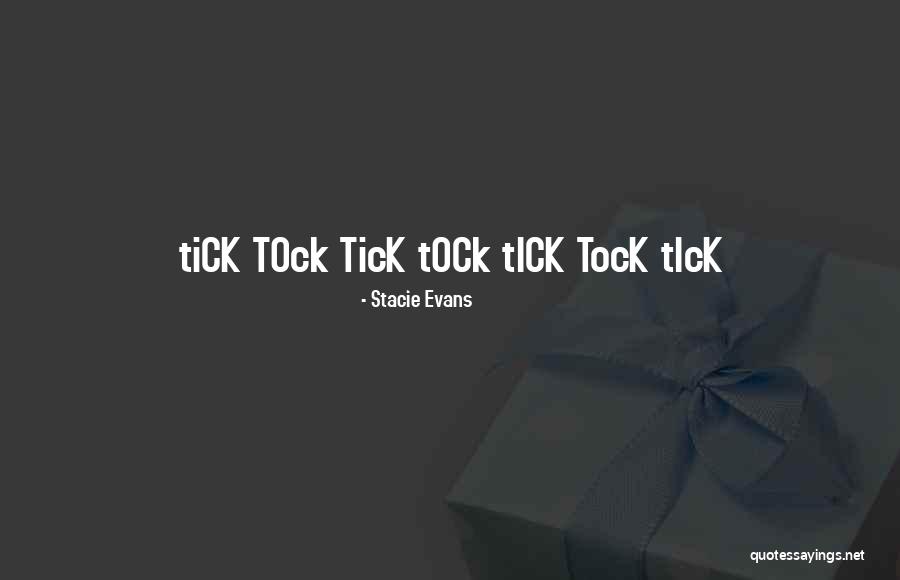
tiCK TOck TicK tOCk tICK TocK tIcK — Stacie Evans
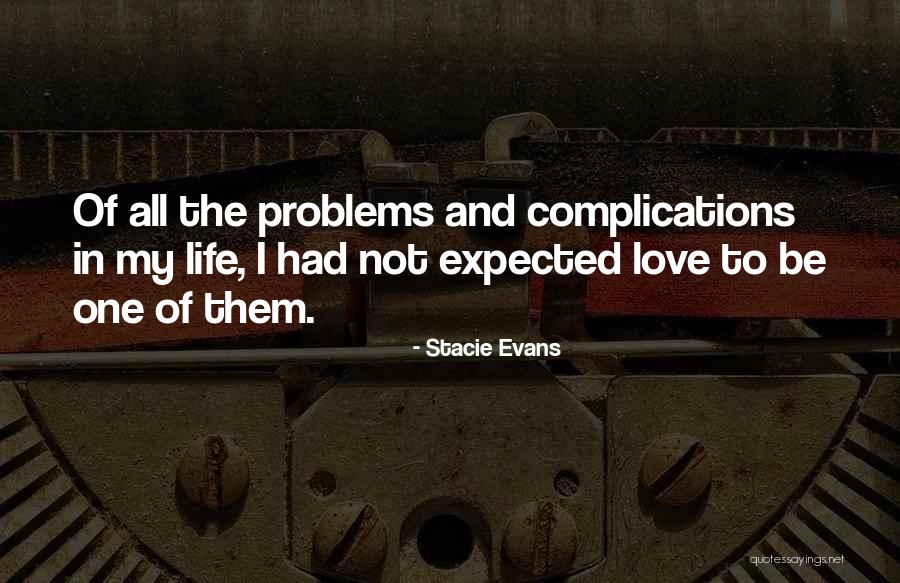
Of all the problems and complications in my life, I had not expected love to be one of them. — Stacie Evans
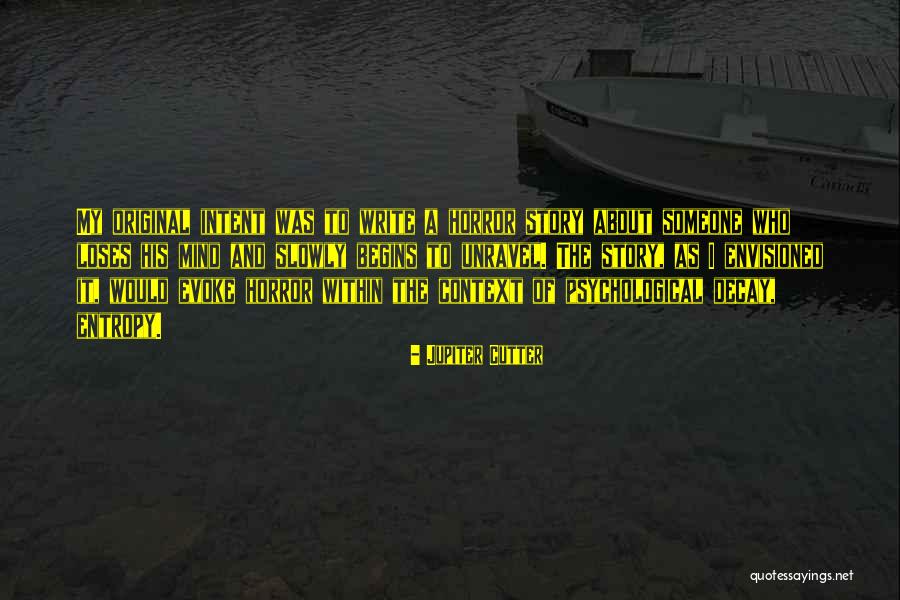
My original intent was to write a horror story about someone who loses his mind and slowly begins to unravel. The story, as I envisioned it, would evoke horror within the context of psychological decay, entropy. — Jupiter Cutter
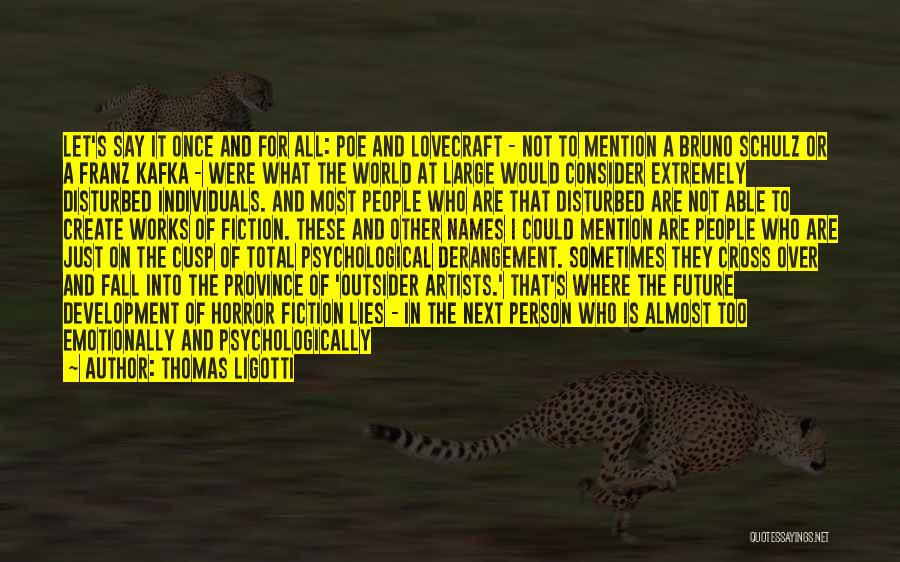
Let's say it once and for all: Poe and Lovecraft - not to mention a Bruno Schulz or a Franz Kafka - were what the world at large would consider extremely disturbed individuals. And most people who are that disturbed are not able to create works of fiction. These and other names I could mention are people who are just on the cusp of total psychological derangement. Sometimes they cross over and fall into the province of 'outsider artists.' That's where the future development of horror fiction lies - in the next person who is almost too emotionally and psychologically damaged to live in the world but not too damaged to produce fiction. — Thomas Ligotti
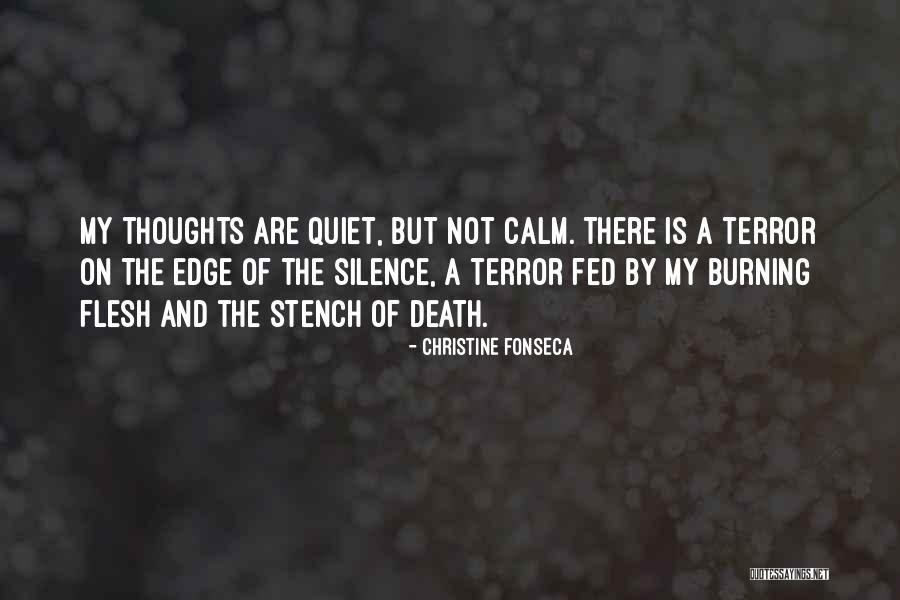
My thoughts are quiet, but not calm. There is a terror on the edge of the silence, a terror fed by my burning flesh and the stench of death. — Christine Fonseca
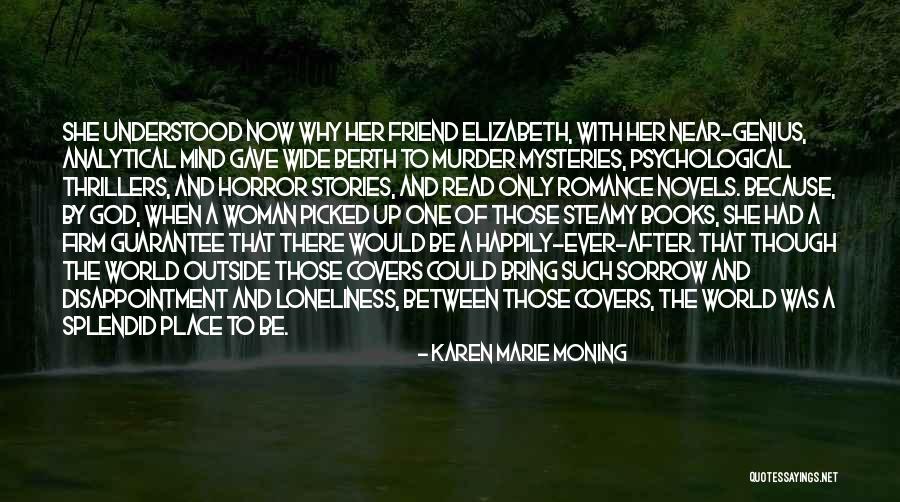
She understood now why her friend Elizabeth, with her near-genius, analytical mind gave wide berth to murder mysteries, psychological thrillers, and horror stories, and read only romance novels. Because, by God, when a woman picked up one of those steamy books, she had a firm guarantee that there would be a Happily-Ever-After. That though the world outside those covers could bring such sorrow and disappointment and loneliness, between those covers, the world was a splendid place to be. — Karen Marie Moning
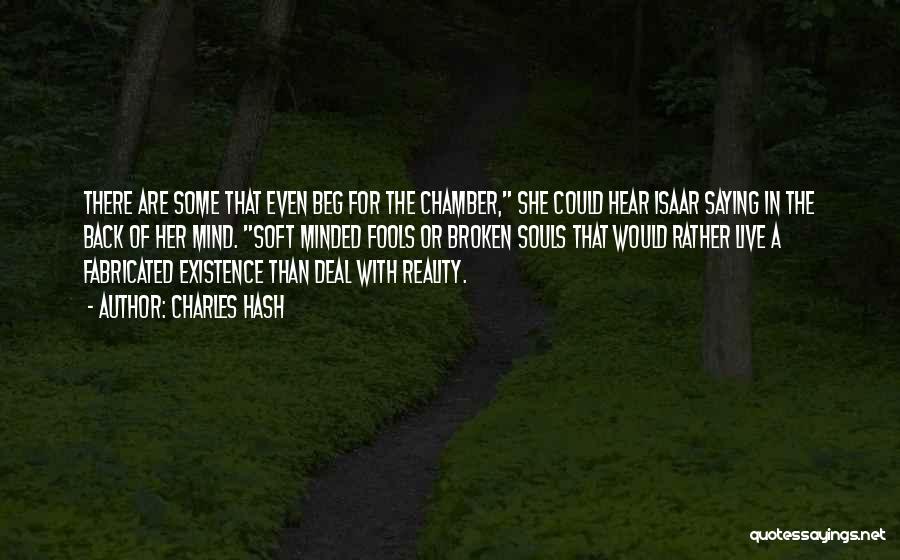
There are some that even beg for the Chamber," she could hear Isaar saying in the back of her mind. "Soft minded fools or broken souls that would rather live a fabricated existence than deal with reality. — Charles Hash
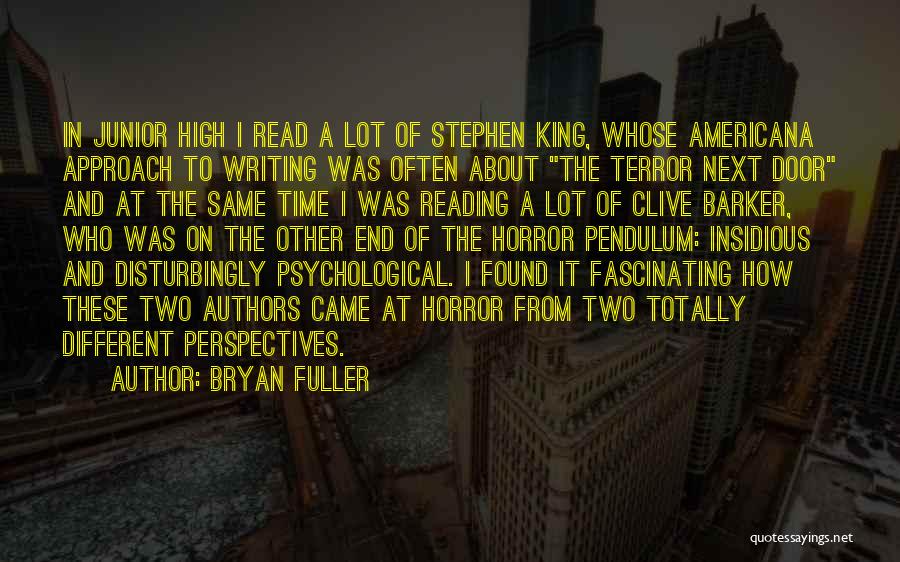
In junior high I read a lot of Stephen King, whose Americana approach to writing was often about "the terror next door" and at the same time I was reading a lot of Clive Barker, who was on the other end of the horror pendulum: insidious and disturbingly psychological. I found it fascinating how these two authors came at horror from two totally different perspectives. — Bryan Fuller
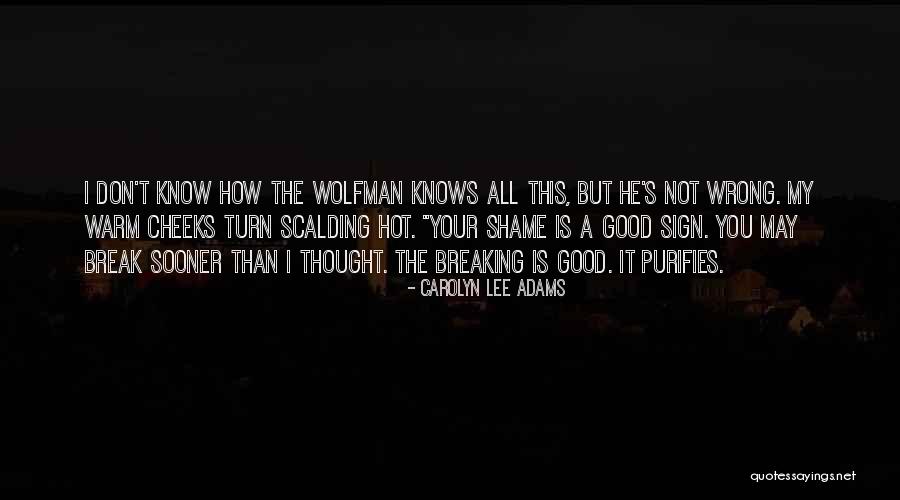
I don't know how the Wolfman knows all this, but he's not wrong. My warm cheeks turn scalding hot.
"Your shame is a good sign. You may break sooner than I thought. The breaking is good. It purifies. — Carolyn Lee Adams
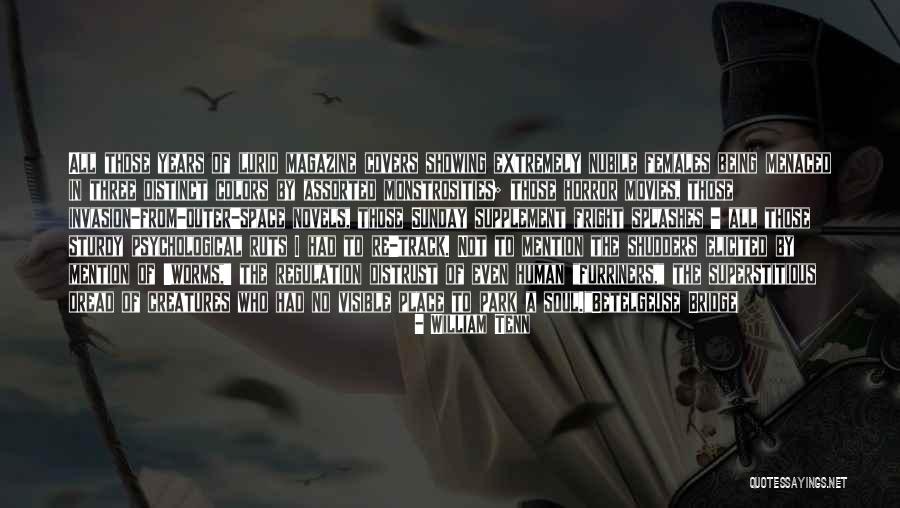
All those years of lurid magazine covers showing extremely nubile females being menaced in three distinct colors by assorted monstrosities; those horror movies, those invasion-from-outer-space novels, those Sunday supplement fright splashes - all those sturdy psychological ruts I had to re-track. Not to mention the shudders elicited by mention of 'worms,' the regulation distrust of even human "furriners," the superstitious dread of creatures who had no visible place to park a soul.
("Betelgeuse Bridge) — William Tenn
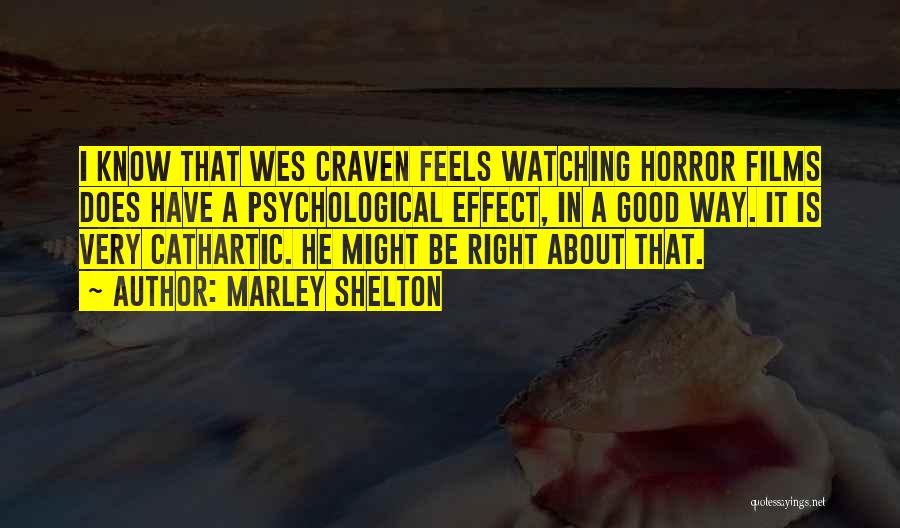
I know that Wes Craven feels watching horror films does have a psychological effect, in a good way. It is very cathartic. He might be right about that. — Marley Shelton
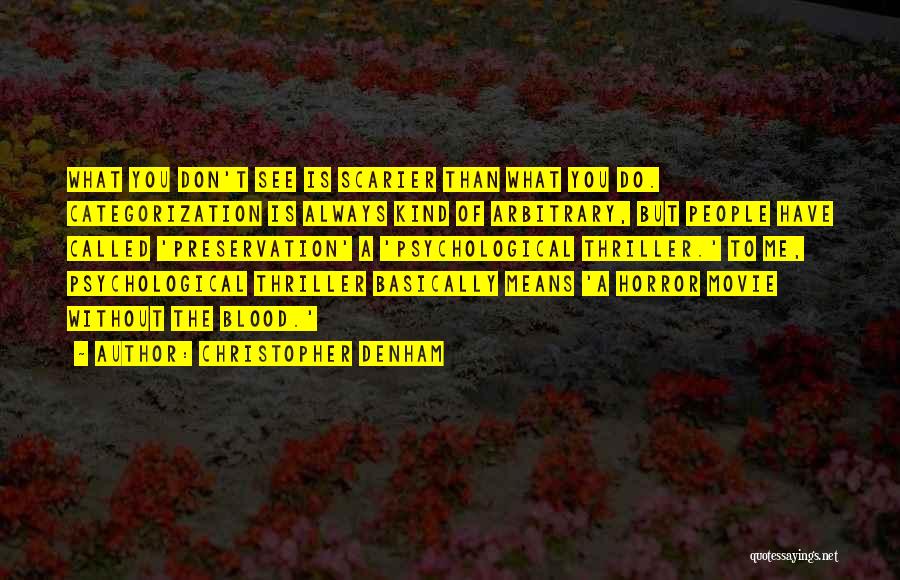
What you don't see is scarier than what you do. Categorization is always kind of arbitrary, but people have called 'Preservation' a 'psychological thriller.' To me, psychological thriller basically means 'a horror movie without the blood.' — Christopher Denham
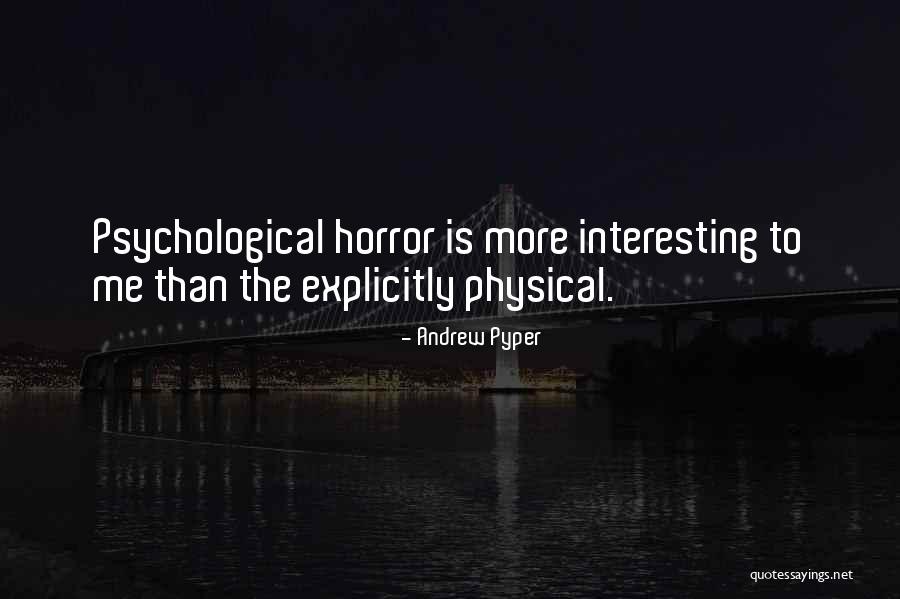
Psychological horror is more interesting to me than the explicitly physical. — Andrew Pyper
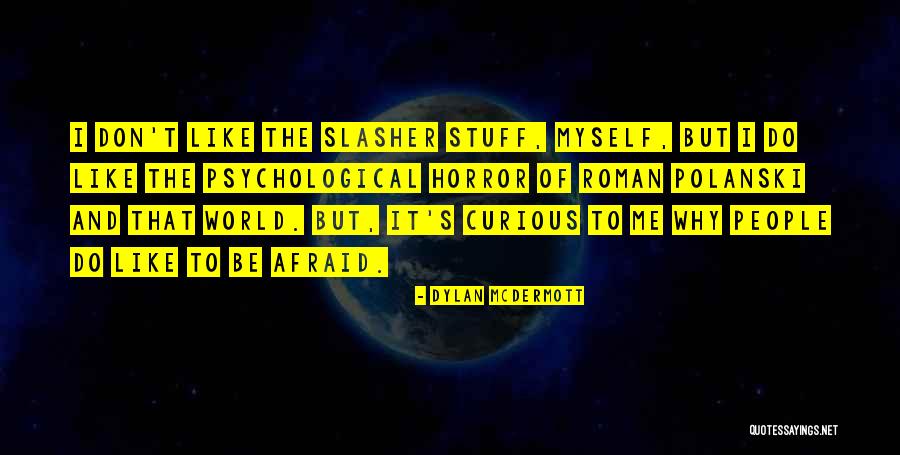
I don't like the slasher stuff, myself, but I do like the psychological horror of Roman Polanski and that world. But, it's curious to me why people do like to be afraid. — Dylan McDermott
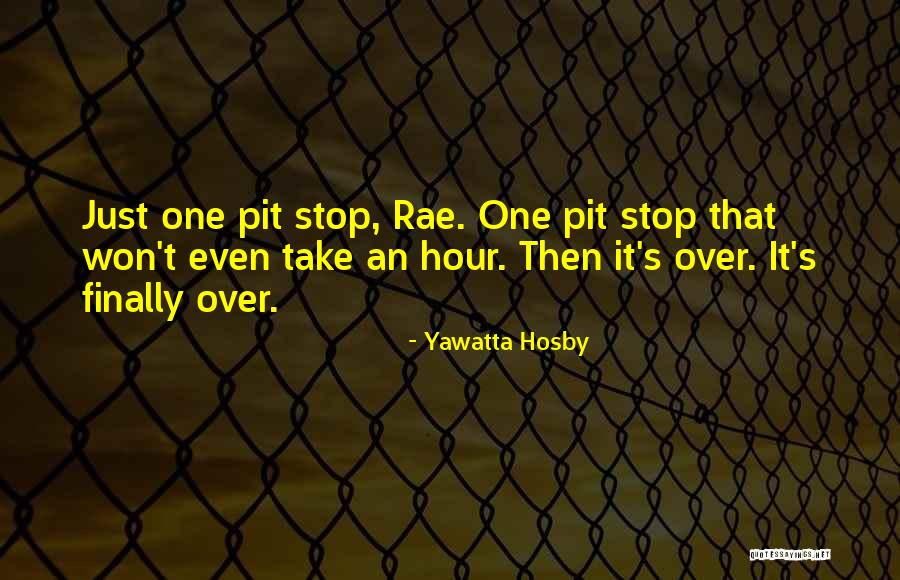
Just one pit stop, Rae. One pit stop that won't even take an hour. Then it's over. It's finally over. — Yawatta Hosby
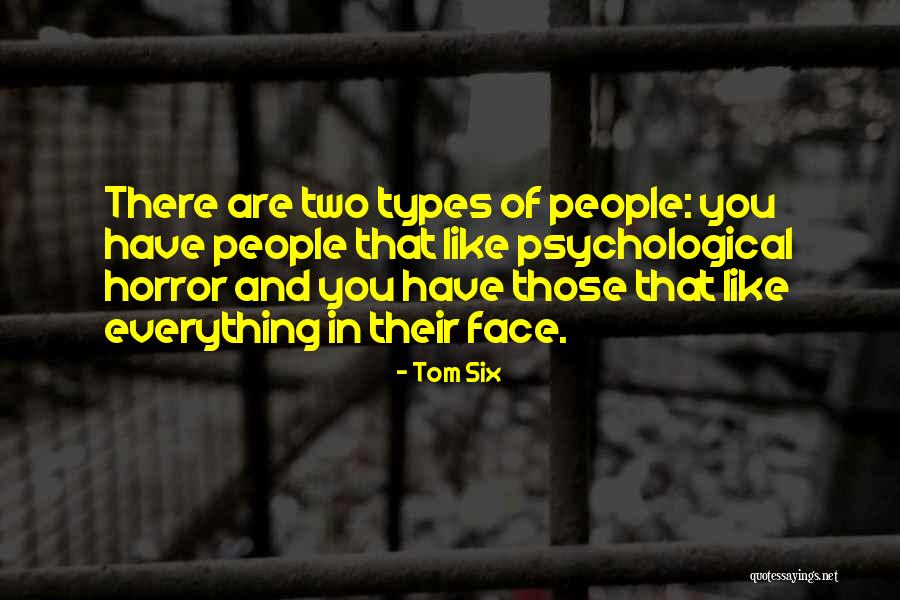
There are two types of people: you have people that like psychological horror and you have those that like everything in their face. — Tom Six
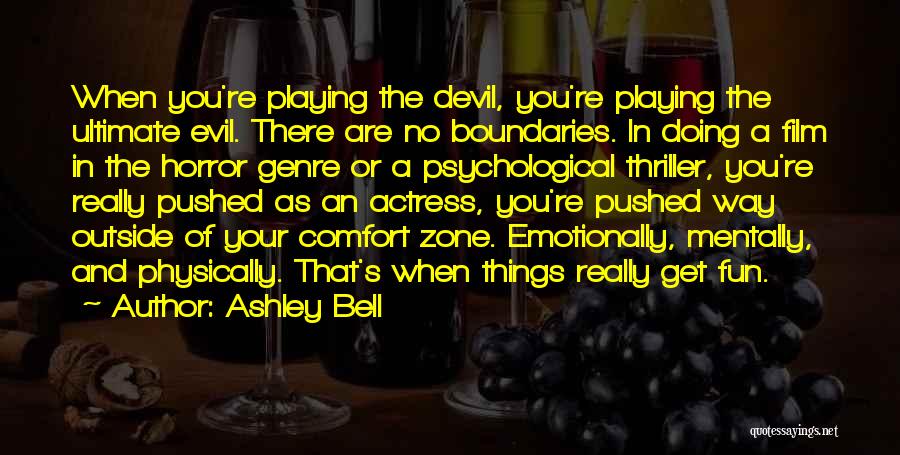
When you're playing the devil, you're playing the ultimate evil. There are no boundaries. In doing a film in the horror genre or a psychological thriller, you're really pushed as an actress, you're pushed way outside of your comfort zone. Emotionally, mentally, and physically. That's when things really get fun. — Ashley Bell
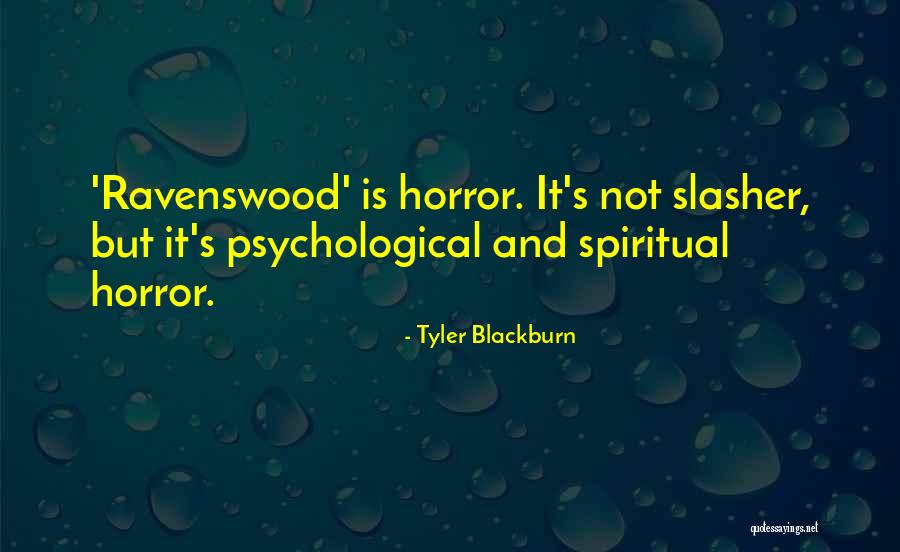
'Ravenswood' is horror. It's not slasher, but it's psychological and spiritual horror. — Tyler Blackburn
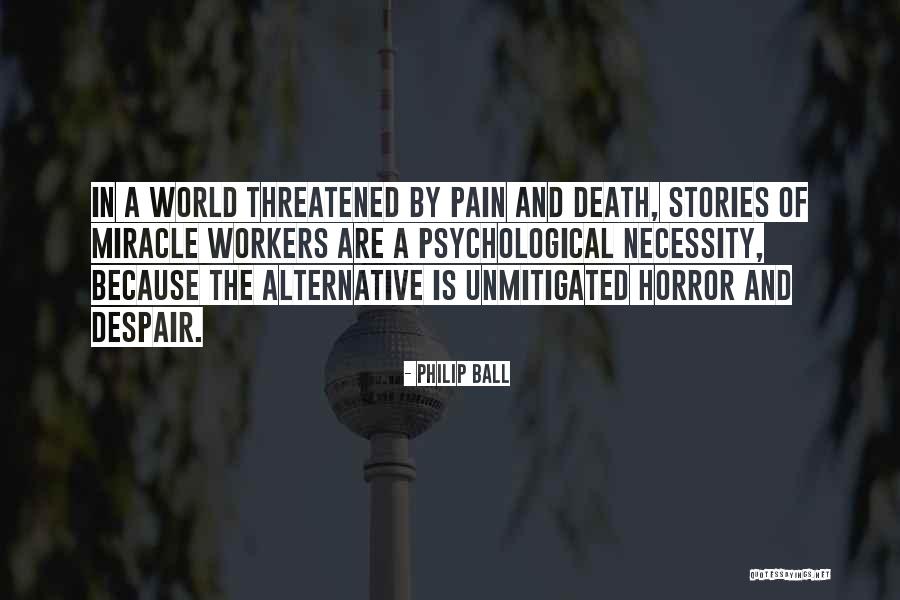
In a world threatened by pain and death, stories of miracle workers are a psychological necessity, because the alternative is unmitigated horror and despair. — Philip Ball
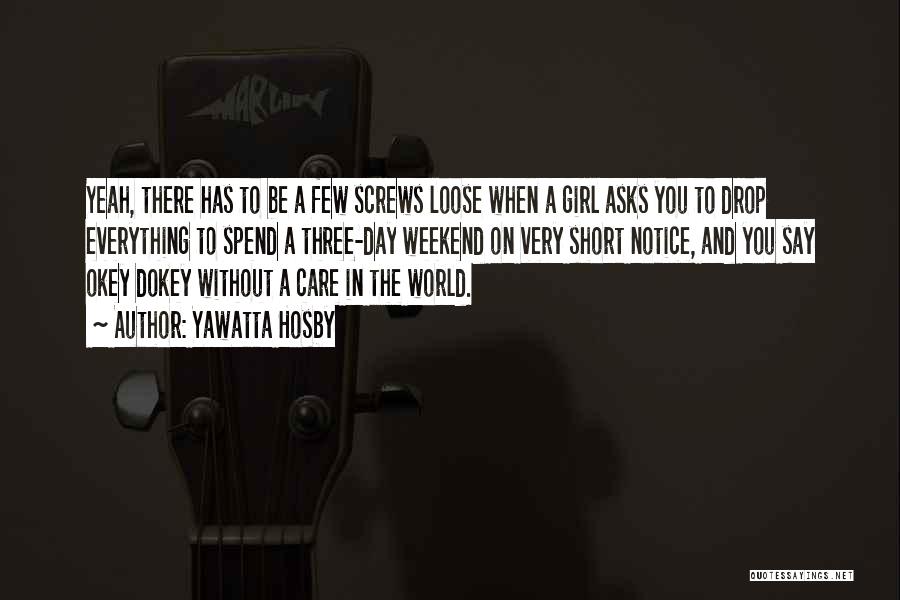
Yeah, there has to be a few screws loose when a girl asks you to drop everything to spend a three-day weekend on very short notice, and you say okey dokey without a care in the world. — Yawatta Hosby
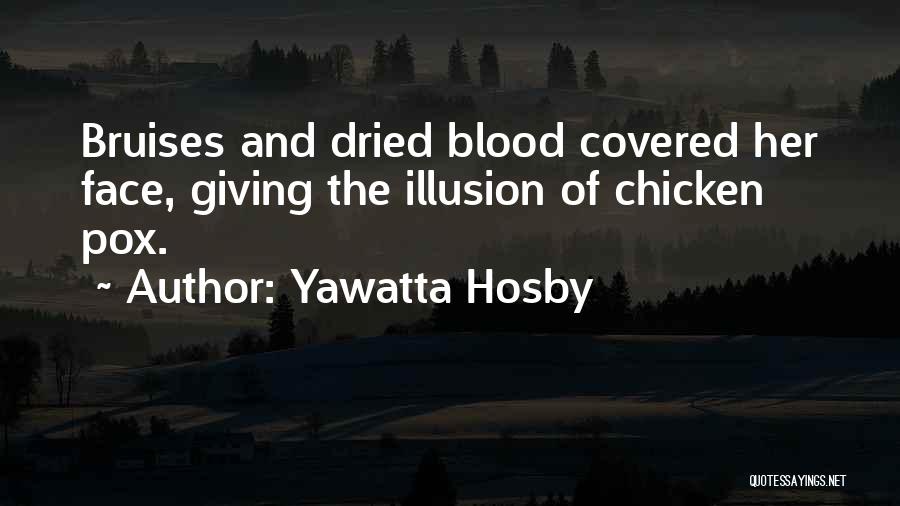
Bruises and dried blood covered her face, giving the illusion of chicken pox. — Yawatta Hosby
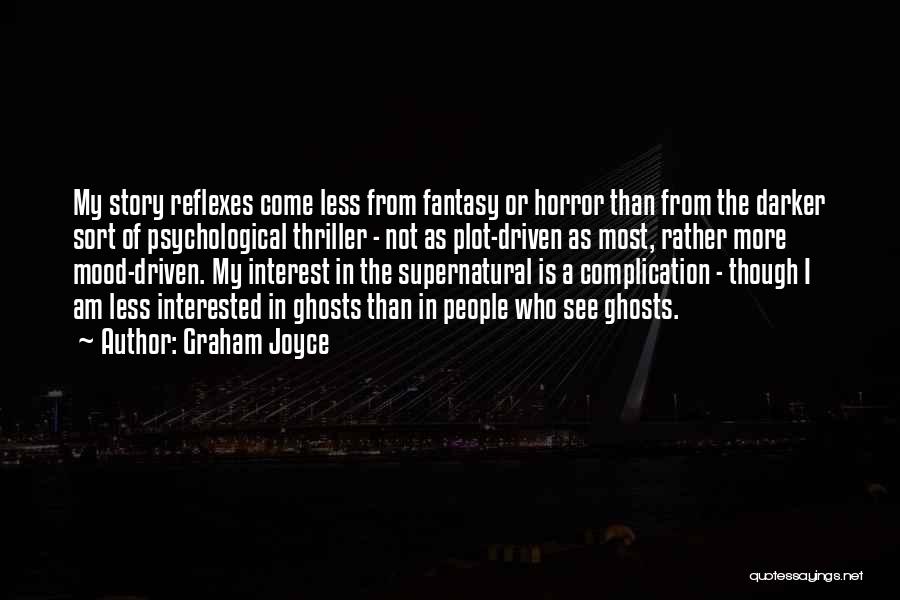
My story reflexes come less from fantasy or horror than from the darker sort of psychological thriller - not as plot-driven as most, rather more mood-driven. My interest in the supernatural is a complication - though I am less interested in ghosts than in people who see ghosts. — Graham Joyce
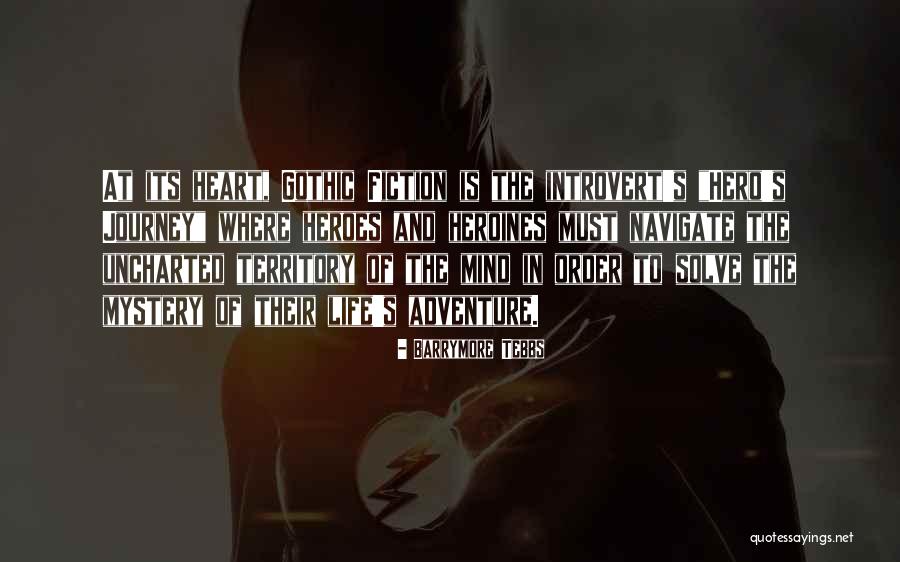
At its heart, Gothic Fiction is the introvert's "Hero's Journey" where heroes and heroines must navigate the uncharted territory of the mind in order to solve the mystery of their life's adventure. — Barrymore Tebbs
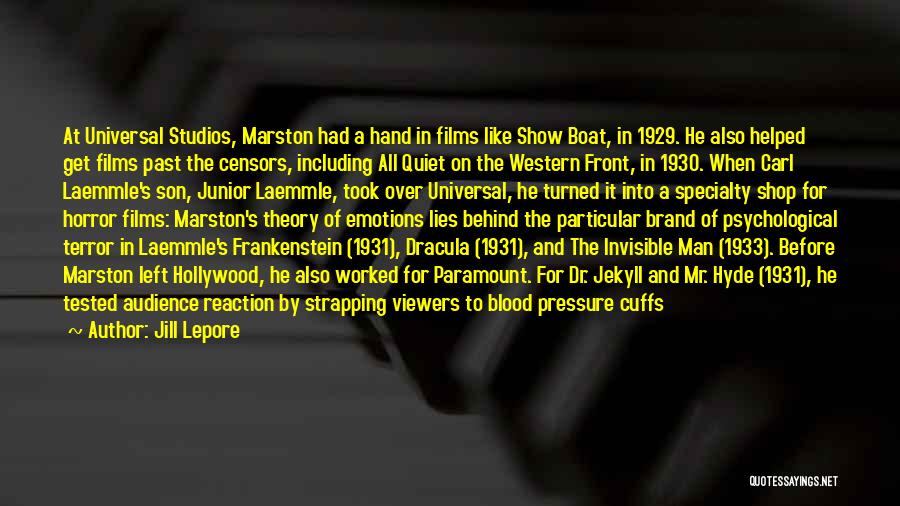
At Universal Studios, Marston had a hand in films like Show Boat, in 1929. He also helped get films past the censors, including All Quiet on the Western Front, in 1930. When Carl Laemmle's son, Junior Laemmle, took over Universal, he turned it into a specialty shop for horror films: Marston's theory of emotions lies behind the particular brand of psychological terror in Laemmle's Frankenstein (1931), Dracula (1931), and The Invisible Man (1933). Before Marston left Hollywood, he also worked for Paramount. For Dr. Jekyll and Mr. Hyde (1931), he tested audience reaction by strapping viewers to blood pressure cuffs while they watched the rushes.30 — Jill Lepore
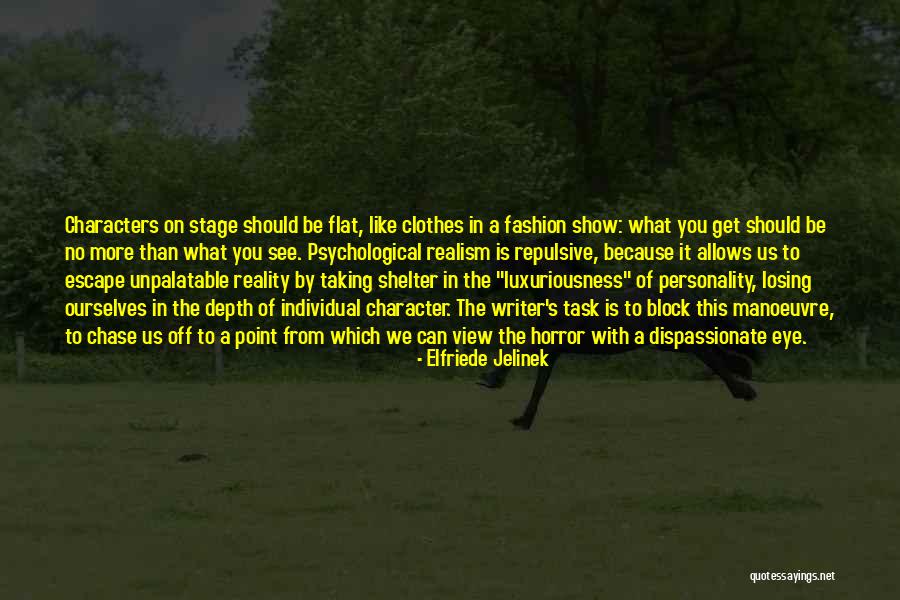
Characters on stage should be flat, like clothes in a fashion show: what you get should be no more than what you see. Psychological realism is repulsive, because it allows us to escape unpalatable reality by taking shelter in the "luxuriousness" of personality, losing ourselves in the depth of individual character. The writer's task is to block this manoeuvre, to chase us off to a point from which we can view the horror with a dispassionate eye. — Elfriede Jelinek
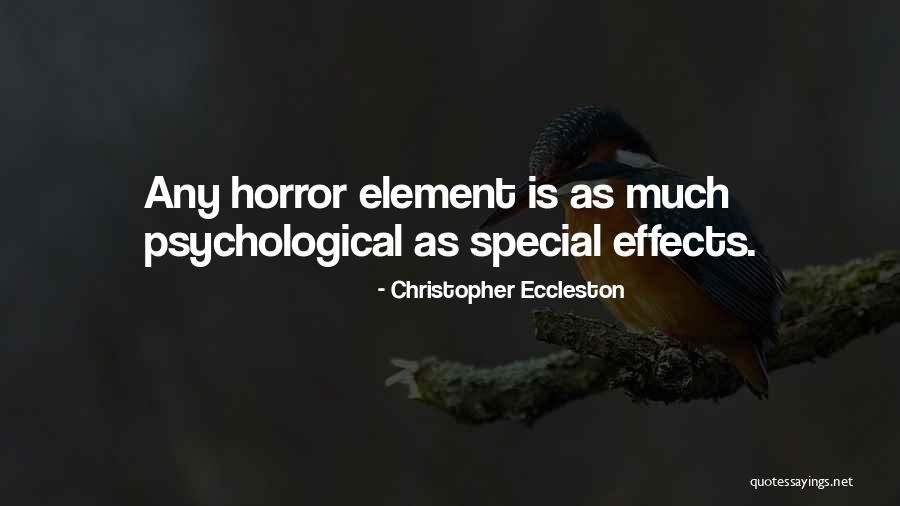
Any horror element is as much psychological as special effects. — Christopher Eccleston
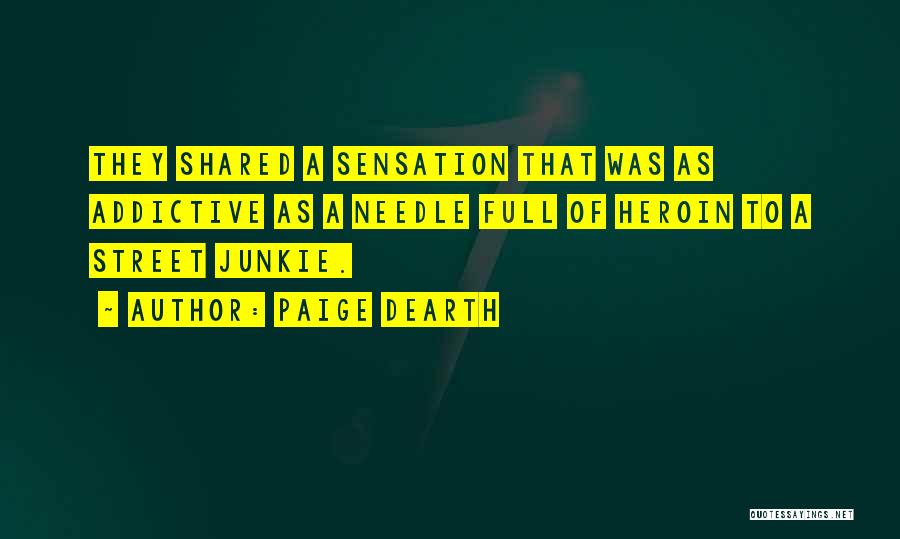
They shared a sensation that was as addictive as a needle full of heroin to a street junkie. — Paige Dearth
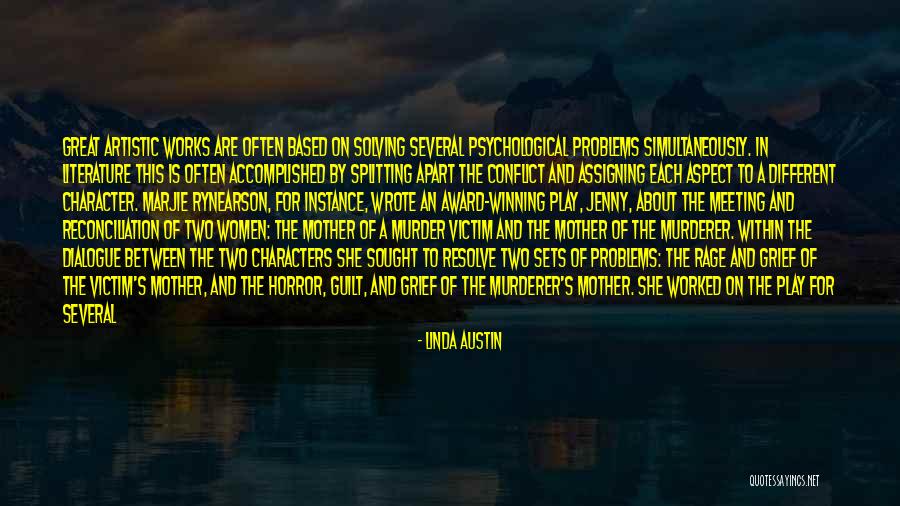
Great artistic works are often based on solving several psychological problems simultaneously. In literature this is often accomplished by splitting apart the conflict and assigning each aspect to a different character. Marjie Rynearson, for instance, wrote an award-winning play, Jenny, about the meeting and reconciliation of two women: the mother of a murder victim and the mother of the murderer. Within the dialogue between the two characters she sought to resolve two sets of problems: the rage and grief of the victim's mother, and the horror, guilt, and grief of the murderer's mother. She worked on the play for several years, and only when it was finished did she realize that through it she was struggling to resolve her feelings about the suicide of her best friend. Rynearson had simultaneously been, in effect, both the friend of the victim and the friend of the perpetrator of the killing. The power of the work lay in its simultaneous resolution of conflicting problems. — Linda Austin
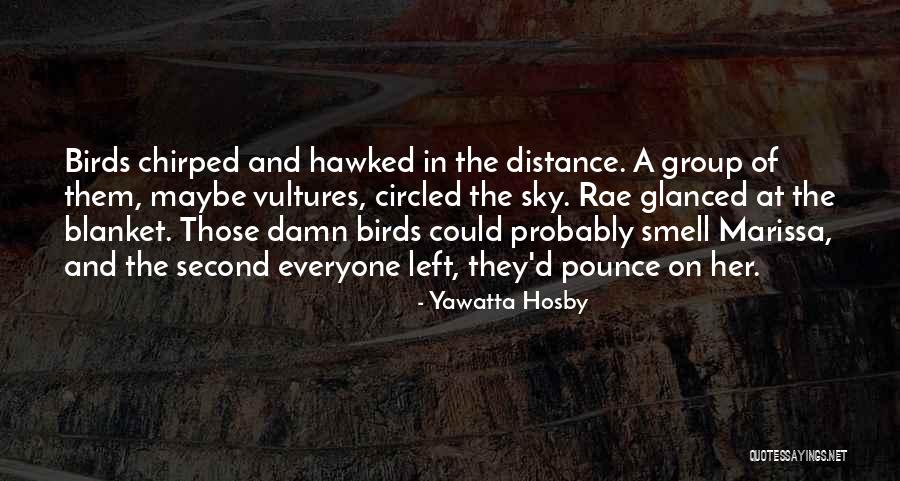
Birds chirped and hawked in the distance. A group of them, maybe vultures, circled the sky. Rae glanced at the blanket. Those damn birds could probably smell Marissa, and the second everyone left, they'd pounce on her. — Yawatta Hosby
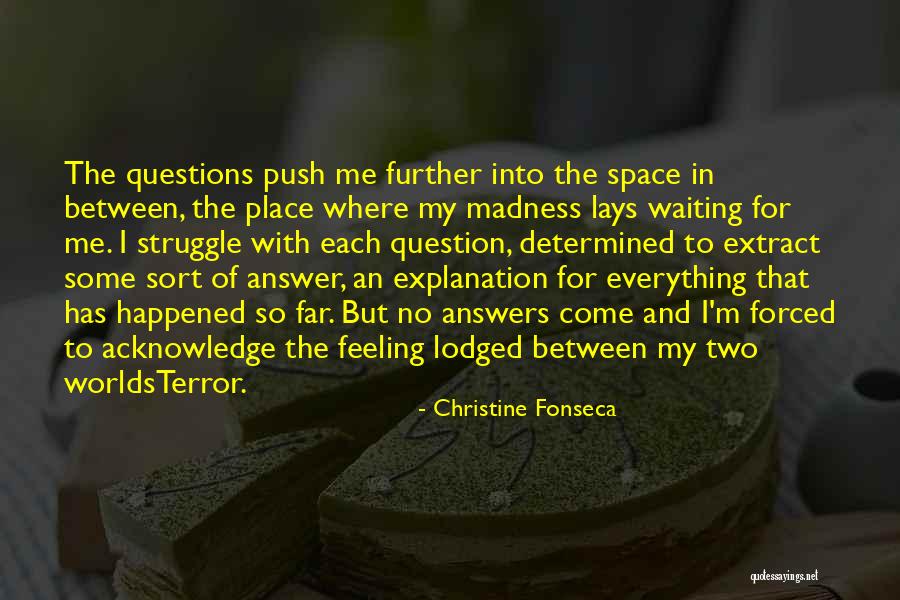
The questions push me further into the space in between, the place where my madness lays waiting for me. I struggle with each question, determined to extract some sort of answer, an explanation for everything that has happened so far. But no answers come and I'm forced to acknowledge the feeling lodged between my two worlds
Terror. — Christine Fonseca





